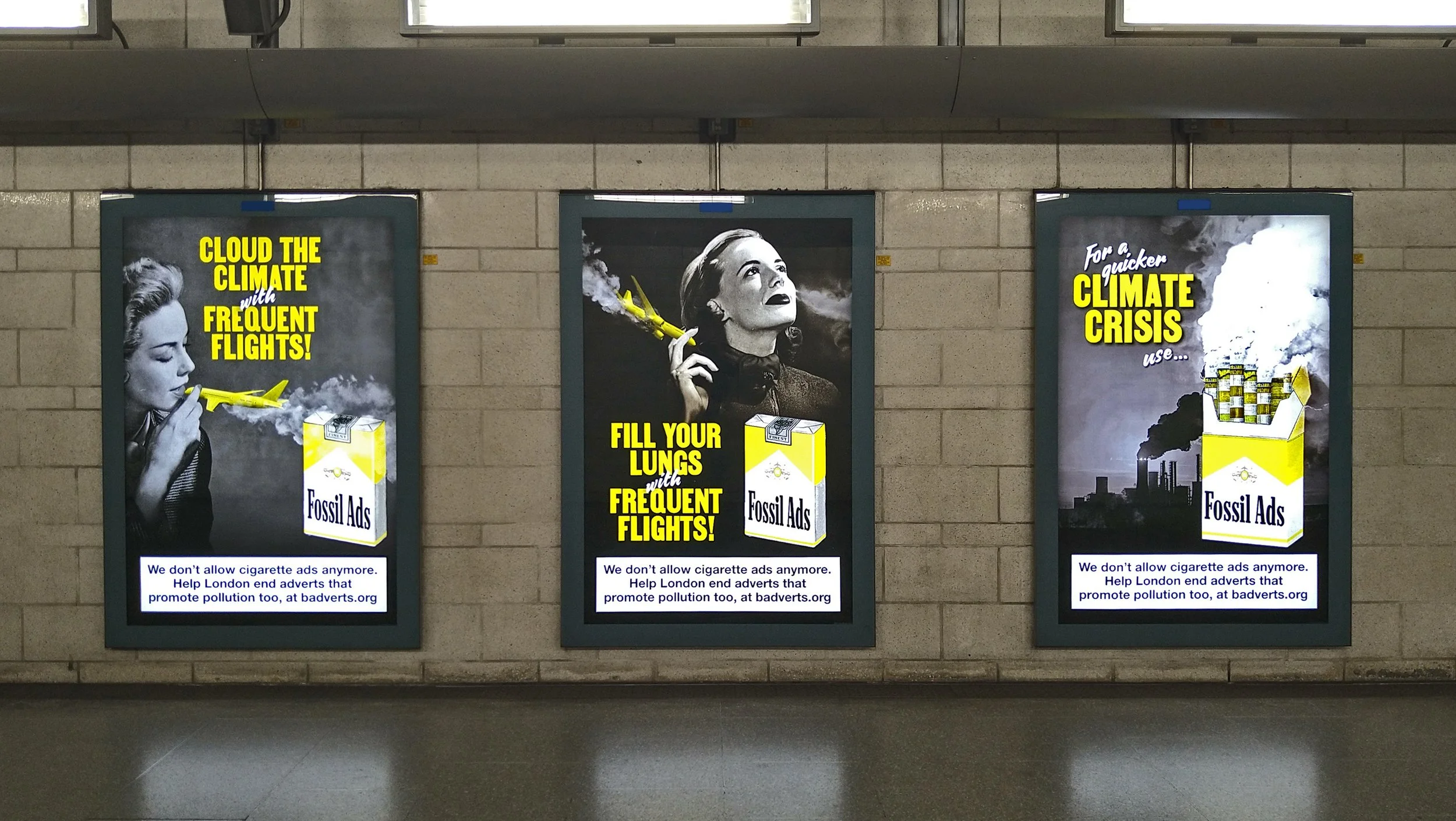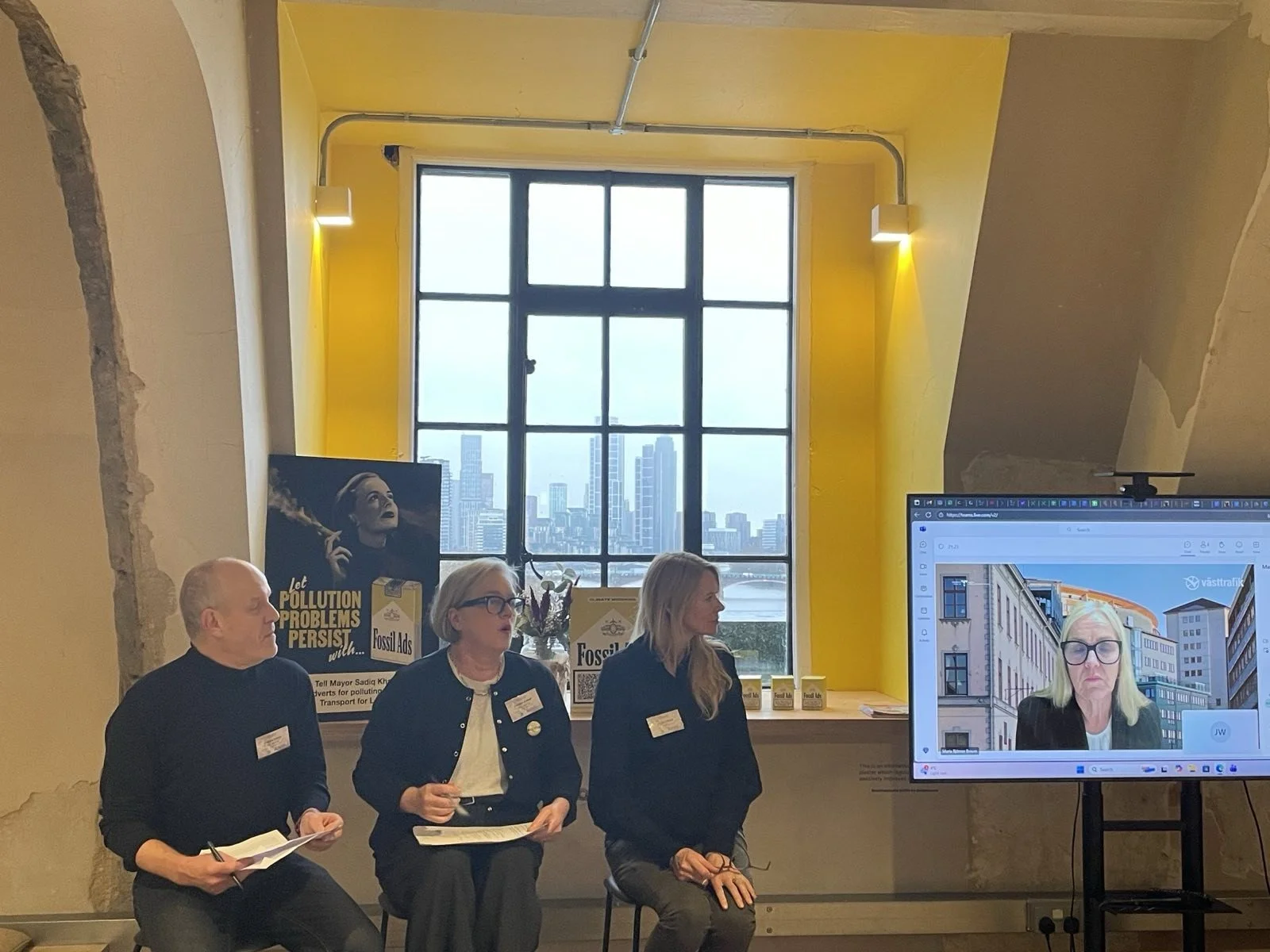How we can end polluting advertising in London
In November, London Mayor Sadiq Khan told delegates at the C40 World Mayor’s Summit in Rio that we face “an existential fight between the climate wreckers and the climate defenders”, and that “with a little will and imagination… we can deliver meaningful green policy.”
Just days later, policymakers, researchers and campaigners met in London to discuss a tangible, low-cost policy London’s Mayor could take to reduce air pollution and emissions: restricting advertising for polluters and carbon-intensive ways of living on the Transport for London (TfL) network.
We heard from Maria Bjorner Brauer, head of sales and marketing at Västtrafik, the Swedish transport authority for the Gothenburg region which ended advertising for fossil fuels, fossil-fuel dependent products, vehicles powered by fossil fuels and aviation on all buses, trams, trains and boats, as well as around 650 bus stop shelters, in January 2025.
Maria told attendees that this was a straightforward business case: sustainability underpinned their brand, and it was both hypocritical to take fossil fuel revenue and counterproductive to their mission of sustainable motility. (The transport operator has even developed their own satirical ads to promote electrified public transport.)
When asked if Västtrafik had faced any difficulties in implementing the ban, Maria described a process in which their advertising business partner makes an initial call on whether or not an ad is allowed under the policy. If an ad falls into a grey area, it is raised to Västtrafik officials who make a final decision. “It has not been difficult”, she said. Nor has the transport operator lost revenue, although she acknowledged that the proportion of fossil fuel advertising on the network was not high initially.
If you saw ads for cigarettes on the tube you’d be shocked, so why do we accept ads for polluting products like fossil fuels, cars and flights? We recently took over Southwark station with spoof adsok-over-southwark-station-calling-for-london-to-end-ads-promoting-pollution making exactly this point.
London Assembly Member Caroline Russell spoke to her past record of raising questions to the Mayor regarding polluting advertising. She has a track record of instigating TfL-wide restrictions on ads on ethical grounds, including those that are body shaming, or promote countries with oppressive regimes.
Russell acknowledged that Khan faces a difficult political context, having already experienced kickback when he spearheaded the introduction of an Ultra Low Emission Zone (ULEZ) in London from 2019-2023. However, she noted that Londoners’ lived experience belied right wing parties’ rhetoric against clean air policymaking: “when you actually talk to people they’re worried about family members with COPD or asthma and they want action on clean air”.
ULEZ was recently found to be successful in reducing the levels of deadly pollutants Londoners are exposed to; however, experts warn that more is needed.
Panelist Dr Victoria Harvey worked in advertising for 15 years before completing a doctorate exploring the industry’s impact on delaying climate action. Advertising is a multi million pound industry that creates awareness, forms conscious and unconscious perceptions, and promotes consumption, she outlined. Advertising for polluting products, therefore, acts to delay action to reduce consumption of such products, not just at an individual “consumer” level, but at a local and national policy level, too. The ad industry, Dr Harvey highlighted, is enraptured by polluting businesses, and the regulatory system is in turn captured by the ad industry.
“We are complicit in the advertising industry... we are complicit in the delay [to Net Zero]. We target politicians and financial decision makers to make them think that fossil fuel clients are part of the solution – like, that’s in the briefs”
Since Sadiq Khan pledged in 2018 to make London a zero carbon city, hundreds of fossil fuel ad campaigns have run on the TfL network, with firms directly targeting centres of political influence. Shell and BP were among fossil fuel companies using “station domination” takeovers of all the ad space in Westminster and St James’ tube stations. Speaking to attendees, Andrew Simms described how he had seen at least 27 high-carbon adverts on his way to the venue, noting that the voices of scientists and experts advocating for urgent action on all fronts to prevent further planetary heating are effectively drowned out by mass media advertising promoting polluting industries.
From left: Andrew Simms, Caroline Russell, Dr Viki Harvey, Maria Brauer (on screen).
Policies to restrict polluting ads have been implemented in Edinburgh, Sheffield, Stockholm, and many more global cities are recent, meaning empirical evidence for the impacts of these policies is limited; however, it is clear that reducing exposure to advertising is effective, as was shown by TfL’s ban on junk food ads in 2019. We also know that TfL is lawfully entitled to act.
TfL has set a strong precedent for impactful, common sense controls on advertising. Climate change and polluted air have been high on Khan’s agenda since taking office as London’s mayor, and his policies thus far have been effective.
Join the call for Sadik Khan to introduce a Low Carbon Advertising and Sponsorship Policy, for cleaner air, better health, and to remove unfair fossil fuel influence on politics and people.
Mayor’s Question Time - 20th November 2025
In response to the following question from Caroline Russell AM:
Does the continued acceptance of adverts for fossil fuels, frequent flights and SUVs on the public transport network undermine your positive action to clean up London’s air?
The Mayor pledged to review Transport for London’s advertising policy and urged national government and the Advertising Standards Authority to provide guidance on how to define high carbon advertising. You can see the full response in the video below.
The Mayor of London responds to a question about polluting ads on Transport for London (20th Nov 2025)


